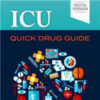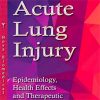Enteral Fluid Resuscitation? The WHO to the rescue in the ED/ICU?
thinkingcriticalcare.comPrior to the 1970’s, restricting oral intake was a “cornerstone” therapy of diarrheal illness, due to the pervasive belief that the GI tract needed time to heal and recover before resuming normal function.
This was felt to be crucial. Hence, only IV therapy was used (in developed countries), and in the underdeveloped world, the death toll was appalling – especially among children.
In the 40’s, Dr. Darrow of Yale started actually studying the GI tract fluid and electrolyte issue, and advocating oral rehydration with mixed fluids. He was able to bring infant mortality radically down in his practice, but it would take over twenty years before a groups started to formally look at this in the 60’s.
Finally, in the late 70’s, the WHO pushed this out into the field, and the childhood worldwide mortality from acute diarrheal illness dropped by over 70%, from over 5 million deaths a year to a bit over 1 million – at that time.
Oral Rehydration Therapy (ORT) is now felt to be one of the most significant advances in modern medicine.
Compared to that impact, all the critical care and cardiology trials are about as significant as a drop in a bucket. We’re not talking about composite end points and subgroup odds ratios of 0.85.

















